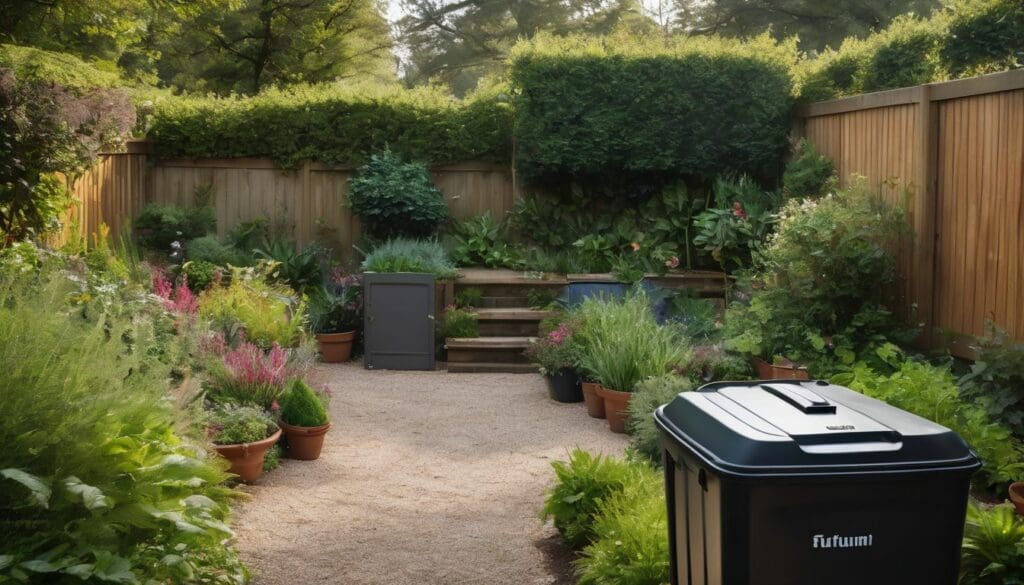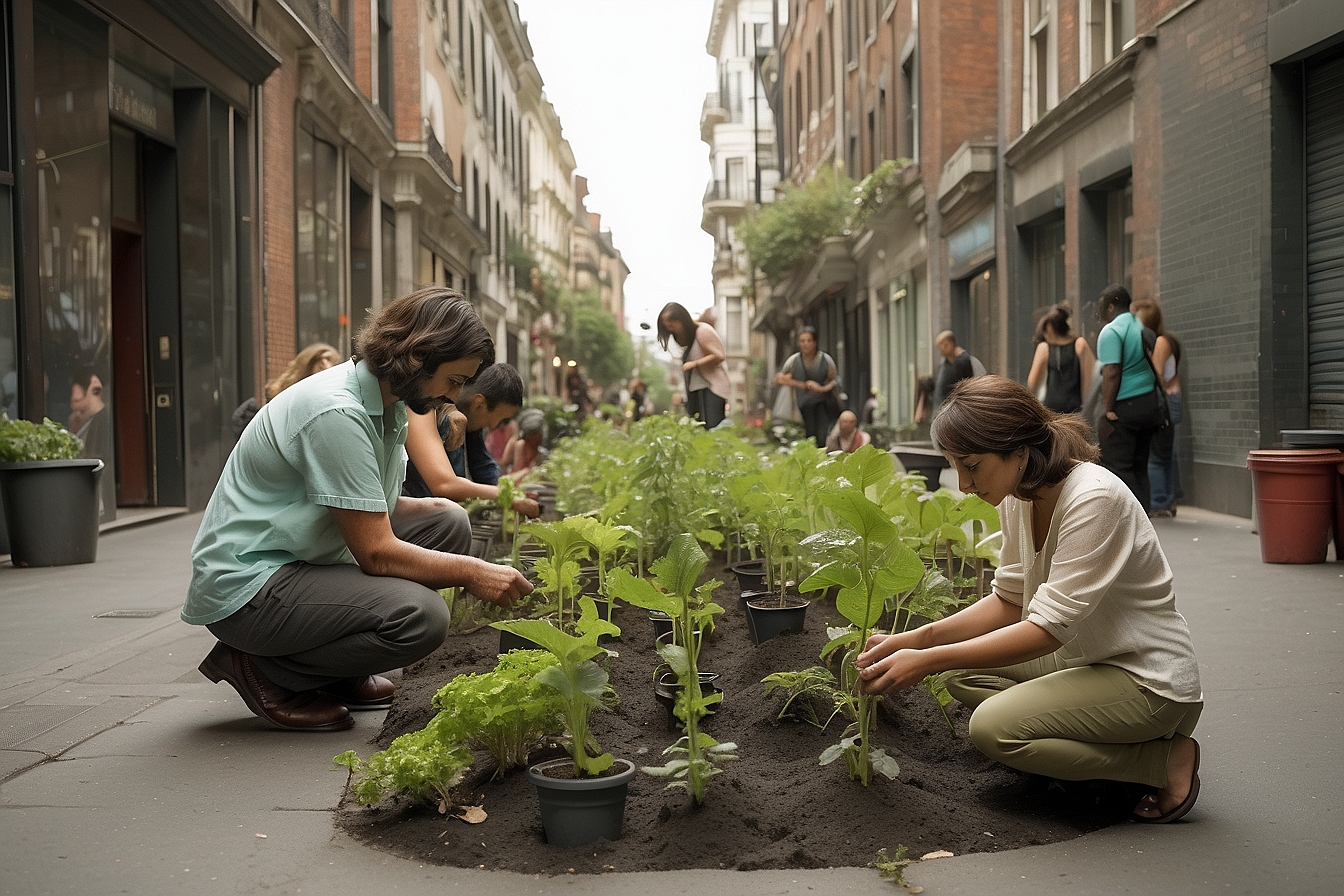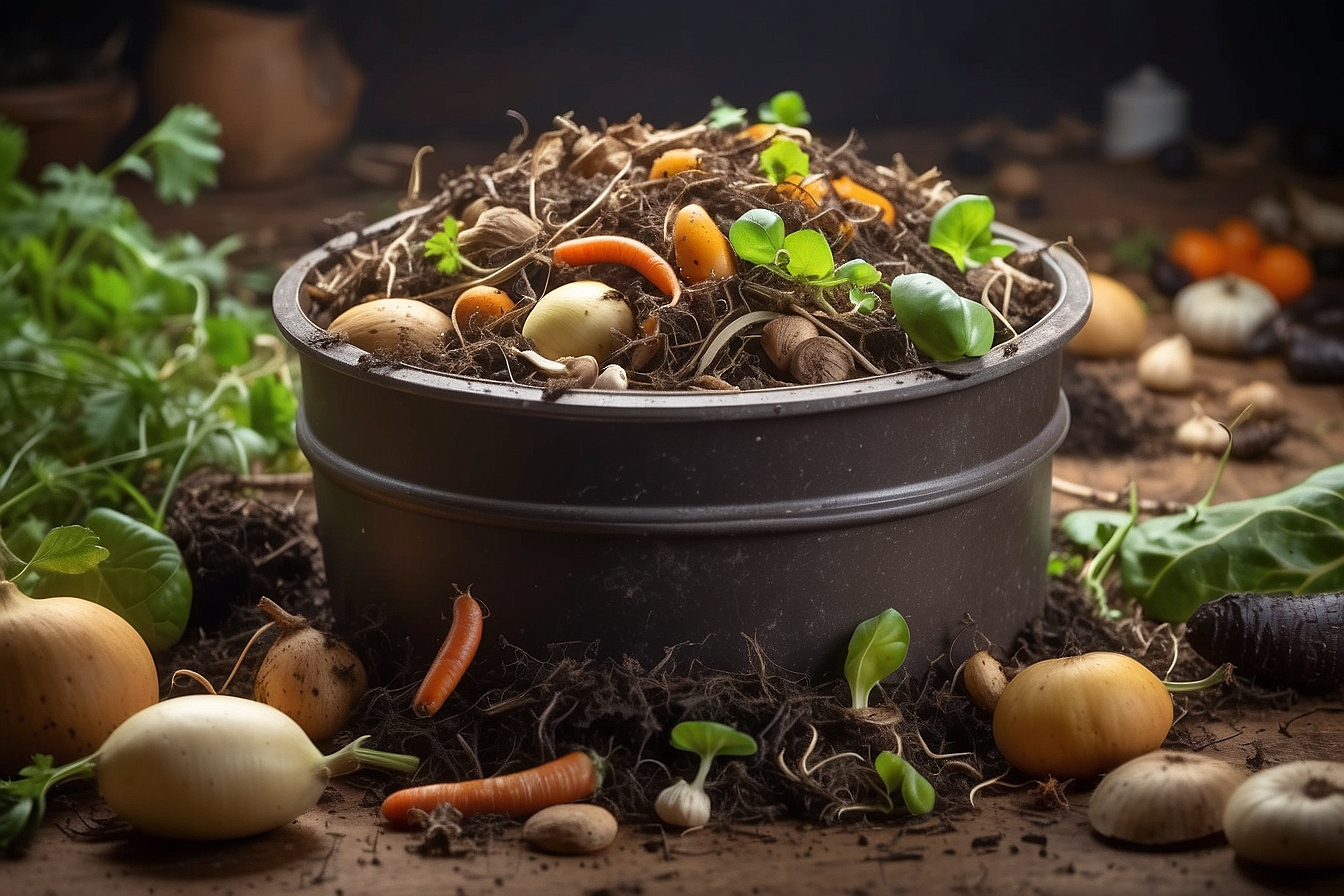We’ve all experienced that twinge of regret as we watch the remnants of a lovely meal turn into nothing more than kitchen waste. You’re certainly not alone in this; together, we’ve wrestled with this frustration and have been on the hunt for smarter ways to repurpose our leftovers.
Our thorough guide is poised to show you how a living compost system can revitalise your garden and gracefully weave your household waste back into nature’s tapestry, right from the comfort of your own home.
Join us as we unearth nature’s clandestine tip for lusher gardens—read on for enlightenment!
Key Takeaways
- Living compost transforms kitchen and garden waste into nutrient – rich soil, enhancing plant growth and soil health without the need for chemical fertilisers.
- Composting at home through methods like bin, trench or vermicomposting reduces methane emissions from landfills contributing to a greener environment.
- The act of composting promotes financial savings by lowering trash collection costs and producing valuable compost that minimises the need for purchased soil amendments.
- By diverting organic waste from landfill through composting, we encourage sustainable living practices, raising awareness about waste management in our communities.
- Community engagement in composting efforts supports local food systems by providing fertile soil for community gardens, which strengthens food security.
What is Composting?
Composting is the natural process of breaking down organic materials, such as food scraps and yard waste, into a nutrient-rich soil amendment. There are different types of home composting methods, including bins, trenches, and vermicomposting using worms.
Definition
Composting is the natural process of recycling organic waste into nutrient-rich soil that revitalises our gardens. It involves breaking down leaves, fruit scraps, and other biodegradable materials with the help of microorganisms in an oxygen-rich environment.
This transformation turns what would have been rubbish into valuable compost, perfect for promoting healthy plant growth and sustainable soil management.
Our role in this cycle is simple but impactful: we gather green waste instead of sending it to landfills. We’re then rewarded with a natural fertiliser that reduces the need for chemical alternatives, bolstering soil fertility while cutting down on pollution.
Truly, by embracing composting, we take significant strides towards environmental sustainability and play our part in nurturing the earth’s health.
Types of home composting (bin, trench, vermicomposting)
When considering home composting, there are several effective methods to choose from. Each method serves the purpose of converting organic waste into nutrient-rich compost for your garden. Here are the key types of home composting:
- Bin composting: This popular method involves using a designated compost bin to contain and decompose organic materials, including kitchen scraps and garden waste. The decomposition process occurs aerobically, with regular turning and moisture management promoting faster breakdown.
- Trench composting: This approach entails digging a trench in your garden or flower bed and filling it with organic matter. As the waste breaks down over time, it enriches the soil directly beneath the surface, delivering nutrients to plant roots and supporting healthy growth.
- Vermicomposting: This method utilises worms to break down organic waste into rich soil amendments known as vermicompost or worm castings. A designated worm bin provides an ideal environment for worms to consume food scraps and produce nutrient-rich humus, offering an excellent source of natural fertiliser for plants.
Benefits of Composting for Plants and Gardening
Composting enriches the soil, providing essential nutrients for plant growth and improving overall health. It also helps to retain moisture in the soil, preventing erosion and ensuring a healthy environment for plants to thrive.
Enriches soil and improves health
Composting enriches soil by adding essential nutrients for plant growth. It enhances soil health, promoting the development of beneficial microorganisms that support overall plant vitality.
Nutrient-rich soil is vital for sustainable gardening and helps in preventing soil erosion.
The process of composting also improves the structure of the soil, leading to better water retention and aeration, which are key factors in sustaining healthy plant growth. This nutrient-recycling practice contributes to sustainable agriculture and supports environmental benefits such as reducing greenhouse gas emissions and managing organic waste effectively.
Increases plant growth and nutrition
Composting enriches soil with essential nutrients, promoting healthy plant growth and increased nutrition. Nutrient-rich compost provides plants with a diverse array of minerals, creating optimal conditions for robust growth.
This results in stronger stems, lusher foliage, and more abundant harvests from your garden or crops.
The organic matter found in living compost supplies plants with a consistent source of nourishment, improving their overall health and resilience. As the compost breaks down, it releases vital nutrients into the soil, fostering an environment that supports long-term plant vitality.
Retains moisture and prevents erosion
After improving plant growth and nutrition, another essential benefit of composting is its ability to retain moisture and prevent erosion in the soil. The organic matter in compost acts like a sponge, absorbing water and releasing it slowly over time.
This helps to keep the soil moist for longer periods, reducing the need for frequent watering and helping plants survive during dry spells. Furthermore, the microorganisms present in compost help bind soil particles together, preventing erosion caused by wind or water runoff.
As a result, using compost enriches the soil’s structure, making it more resistant to erosion while maintaining optimal moisture levels for healthy plant growth.
Economic and Financial Benefits of Composting
Composting saves money on trash bills and produces a valuable resource for gardening. It also promotes waste awareness and encourages sustainable practices.
Saves money on trash bills
Composting reduces the amount of waste sent to landfills, decreasing the volume of trash that needs to be collected and disposed of. By diverting organic materials from garbage bins, composters can save money on trash bills while also producing a valuable resource for their gardens.
This nutrient-rich soil amendment not only benefits plant growth and health but also helps reduce the financial burden associated with waste management.
Furthermore, by incorporating food scraps and yard waste into compost, individuals can lower their overall environmental impact and contribute to a more sustainable lifestyle. Reducing landfill-bound waste through composting is an effective way to manage organic materials responsibly while reaping economic benefits in terms of reduced rubbish collection costs.
Produces valuable resource
Producing valuable resource is a key benefit of composting. Organic waste recycling creates nutrient-rich soil that improves plant growth and nutrition. By turning food scraps and yard waste into compost, we reduce the need for chemical fertilisers while enriching our gardens with natural nutrients.
Moreover, producing valuable resource promotes sustainable living by closing the loop on organic waste. This not only reduces landfill waste but also contributes to a healthier environment by decreasing greenhouse gas emissions.
Ultimately, embracing the practice of composting allows us to harness the full potential of our organic waste and contribute to creating a more environmentally friendly world.
Promotes waste awareness
Composting promotes waste awareness by encouraging individuals to divert organic materials from landfills and instead utilise them for nutrient-rich soil production. This process educates people about the environmental impact of food waste and encourages a sustainable approach to managing organic matter.
By participating in composting, we actively contribute to reducing greenhouse gas emissions, conserving landfill space, and promoting a circular economy that minimises overall waste generation.
Moreover, embracing composting as a method of recycling food scraps fosters an understanding of the value in utilising natural resources efficiently. It inspires us to rethink our consumption habits and empowers communities to take responsibility for their environmental footprint.
Environmental Benefits of Composting
Composting reduces waste in landfills, decreases methane emissions, and supports a sustainable, closed-loop system. Interested to know more about the environmental benefits of composting? Keep reading!
Reduces waste in landfills
Composting reduces waste in landfills, limiting the amount of organic matter unnecessarily taking up space. This decrease in landfill waste contributes to a reduction in methane emissions and supports a more sustainable, closed-loop system.
Nutrient recycling from composting helps address the environmental challenges posed by excessive food waste and contributes to nutrient-rich soil for healthier plant growth and improved soil quality.
Furthermore, lowering the volume of organic materials sent to landfills also lessens the strain on local waste management systems while promoting waste awareness and responsible resource management within communities.
Decreases methane emissions
Composting reduces methane emissions, helping to combat climate change by preventing the release of this potent greenhouse gas into the atmosphere. When organic waste breaks down in a landfill without oxygen, it produces methane.
By diverting food scraps and yard waste away from landfills and into compost bins, we can actively reduce methane emissions and contribute to a healthier environment for future generations.
By composting at home or in community facilities, we can play a vital role in mitigating greenhouse gas emissions that are harmful to the planet. Organic gardening practices such as composting enable us to take an active part in reducing our carbon footprint and supporting a sustainable future.
Supports a sustainable, closed-loop system
Composting supports a sustainable, closed-loop system by diverting organic waste from landfills and using it to create nutrient-rich soil amendments. This process reduces the need for chemical fertilisers, minimises greenhouse gas emissions, and preserves natural resources.
By actively participating in composting, we contribute to a circular economy where organic matter is recycled back into the earth, enriching the soil and supporting healthy plant growth while reducing the overall environmental impact.
Furthermore, supporting a sustainable, closed-loop system through composting aligns with our commitment to environmental stewardship and conservation. It empowers us to take an active role in managing food waste sustainably while contributing to healthier ecosystems and mitigating the effects of climate change.
Social Benefits of Composting
Composting provides educational opportunities for individuals and communities, offering a hands-on approach to environmental stewardship. It also strengthens local food systems by promoting sustainable practices and supporting the growth of community gardens.
Provides educational opportunities
Composting offers educational opportunities for individuals and communities to learn about sustainable waste management. It provides a hands-on way to understand the importance of food waste recycling, nutrient-rich soil production, and greenhouse gas reduction.
By engaging in composting practices, people can gain insights into the natural processes that support environmental conservation while also contributing to local food systems. This educational aspect fosters a deeper understanding of ecological interconnectedness and empowers individuals to make informed choices that benefit both their immediate surroundings and the wider environment.
Taking part in composting not only enriches our knowledge but also strengthens our connection with nature. This practical experience helps us appreciate the value of organic matter in creating healthy soil and supporting plant growth, fostering greater respect for our environment as we become more attuned to its natural cycles.
Strengthens food systems
By providing nutrient-rich soil and promoting local food production, composting strengthens food systems. This process enriches the quality of the soil, leading to improved crop yields and healthier produce.
As a result, communities are able to rely more on locally sourced, sustainable food options that support both environmental conservation and health-conscious living.
Additionally, composting diverts organic waste from landfills, reducing the need for chemical fertilisers in agriculture. This reduces the carbon footprint associated with transporting goods over long distances while also ensuring that food grown within these systems is more environmentally friendly and sustainable.
Supports local communities.
Composting supports local communities by creating opportunities for community engagement and education. It encourages collaboration among neighbours and local organisations, fostering a sense of unity around environmental sustainability.
Additionally, composting creates valuable resources that can be utilised by community gardens, schools, and urban agriculture projects to promote food security and self-sufficiency.
By participating in composting initiatives, individuals contribute to the reduction of waste going into landfills. This not only benefits the environment but also minimises the burden on local waste management systems.
Conclusion
In conclusion, living compost enriches soil and promotes plant growth. It saves money on waste disposal and reduces landfill congestion. By promoting sustainability, it strengthens local communities and supports a closed loop system.
Ultimately, embracing living compost ensures a healthier environment for all.
FAQs
1. What are the benefits of having a living compost?
Living composts enrich your garden by turning waste into nutrient-rich soil and help in preventing soil erosion through their organic processes.
2. How does a living compost prevent soil erosion?
A living compost strengthens the soil structure, which reduces the chance of soil being washed or blown away thus preventing soil erosion effectively.
3. Can I add anything to my compost pile to help with the composting process?
Yes! Mixing green and brown materials helps speed up the composting process, creating healthy, active living matter for your plants quicker.
4. Will using a living compost improve my garden’s health?
Absolutely! Using a living compost will make your garden thrive by providing plants with essential nutrients from decomposed organic material.





